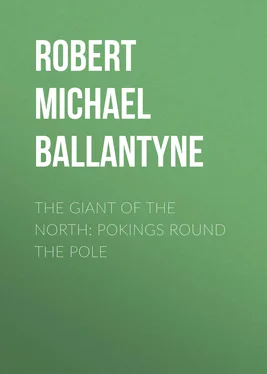Robert Michael Ballantyne - The Giant of the North - Pokings Round the Pole
Здесь есть возможность читать онлайн «Robert Michael Ballantyne - The Giant of the North - Pokings Round the Pole» — ознакомительный отрывок электронной книги совершенно бесплатно, а после прочтения отрывка купить полную версию. В некоторых случаях можно слушать аудио, скачать через торрент в формате fb2 и присутствует краткое содержание. Жанр: Детские приключения, literature_19, foreign_antique, foreign_prose, foreign_children, на английском языке. Описание произведения, (предисловие) а так же отзывы посетителей доступны на портале библиотеки ЛибКат.
- Название:The Giant of the North: Pokings Round the Pole
- Автор:
- Жанр:
- Год:неизвестен
- ISBN:нет данных
- Рейтинг книги:3 / 5. Голосов: 1
-
Избранное:Добавить в избранное
- Отзывы:
-
Ваша оценка:
- 60
- 1
- 2
- 3
- 4
- 5
The Giant of the North: Pokings Round the Pole: краткое содержание, описание и аннотация
Предлагаем к чтению аннотацию, описание, краткое содержание или предисловие (зависит от того, что написал сам автор книги «The Giant of the North: Pokings Round the Pole»). Если вы не нашли необходимую информацию о книге — напишите в комментариях, мы постараемся отыскать её.
The Giant of the North: Pokings Round the Pole — читать онлайн ознакомительный отрывок
Ниже представлен текст книги, разбитый по страницам. Система сохранения места последней прочитанной страницы, позволяет с удобством читать онлайн бесплатно книгу «The Giant of the North: Pokings Round the Pole», без необходимости каждый раз заново искать на чём Вы остановились. Поставьте закладку, и сможете в любой момент перейти на страницу, на которой закончили чтение.
Интервал:
Закладка:
But life is made up of opposites, light and shade, hard and soft, hot and cold, sweet and sour, for the purpose, no doubt, of placing man between two moral battledores so as to drive the weak and erring shuttlecock of his will right and left, and thus keep it in the middle course of rectitude. No sooner had our adventurers sunk to the profoundest depths of gloom, than the battledore of brighter influences began to play upon them. It did not, however, achieve the end at once.
“I’m in the lowest, bluest, dreariest, grumpiest, and most utterly miserable state of mind I ever was in in all my life,” said poor little Benjy Vane, thrusting his hands into his pockets, sitting down on a rock, and gazing round on the waste wilderness, which had only just ceased howling, the very personification of despair.
“So’s I, massa,” said Butterface, looking up from a compound of wet coal and driftwood which he had been vainly trying to coax into a flame for cooking purposes; “I’s most ’orribly miserable!”
There was a beaming grin on the negro’s visage that gave the lie direct to his words.
“That’s always the way with you, Benjy,” said the Captain, “either bubblin’ over with jollity an’ mischief, or down in the deepest blues.”
“Blues! father,” cried the boy, “don’t talk of blues—it’s the blacks I’m in, the very blackest of blacks.”
“Ha! jus’ like me,” muttered Butterface, sticking out his thick lips at the unwilling fire, and giving a blow that any grampus might have envied.
The result was that a column of almost solid smoke, which had been for some time rising thicker and thicker from the coals, burst into a bright flame. This was the first of the sweet influences before referred to.
“Mind your wool, Flatnose,” cried Benjy, as the negro drew quickly back.
It may be remarked here that the mysterious bond of sympathy which united the spirits of Benjy Vane and the black steward found expression in kindly respect on the part of the man, and in various eccentric courses on the part of the boy—among others, in a habit of patting him on the back, and giving him a choice selection of impromptu names, such as Black-mug, Yellow-eyes, Square-jaws, and the like.
“What have you got in the kettle?” asked Leo Vandervell, who came up with some dry driftwood at the moment.
“Bubble-um-squeak,” replied the cook.
“What sort o’ squeak is that?” asked Leo, as he bent his tall strong frame over the fire to investigate the contents of the kettle.
“What am it, massa? Why, it am a bit o’ salt pork, an’ a bit o’ dat bear you shooted troo de nose yes’rday, an’ a junk o’ walrus, an’ two puffins, an’ some injin corn, a leetil pepper, an’ a leetil salt.”
“Good, that sounds well,” said Leo. “I’ll go fetch you some more driftwood, for it’ll take a deal of boiling, that will, to make it eatable.”
The driftwood referred to was merely some pieces of the yacht which had been cast ashore by the hurly-burly of ice and water that had occurred during the last tide. No other species of driftwood was to be found on that coast, for the neighbouring region was utterly destitute of trees.
“Where has Alf gone to?” asked the Captain, as Leo was moving away.
“Oh, he’s looking for plants and shells, as usual,” answered Leo, with a smile. “You know his heart is set upon these things.”
“He’ll have to set his heart on helping wi’ the cargo after supper,” said the Captain, drawing a small notebook and pencil from his pocket.
A few more of the sweet and reviving influences of life now began to circle round the wanderers. Among them was the savoury odour that arose from the pot of bubble-um-squeak, also the improved appearance of the sky.
It was night, almost midnight, nevertheless the sun was blazing in the heavens, and as the storm-clouds had rolled away like a dark curtain, his cheering rays were by that time gilding the icebergs, and rendering the land-cliffs ruddily. The travellers had enjoyed perpetual daylight for several weeks already, and at that high latitude they could count on many more to come. By the time supper was ready, the depressing influences were gone, and the spirits of all had recovered their wonted tone. Indeed it was not to the discredit of the party that they were so much cast down on that occasion, for the parting, perhaps for ever, from the friends with whom they had hitherto voyaged, had much more to do with their sadness than surrounding circumstances or future trials.
“What plan do you intend to follow out, uncle?” asked Alphonse Vandervell, as they sat at supper that night round the kettle.
“That depends on many things, lad,” replied the Captain, laying down his spoon, and leaning his back against a convenient rock. “If the ice moves off, I shall adopt one course; if it holds fast I shall try another. Then, if you insist on gathering and carrying along with you such pocket-loads of specimens, plants, rocks, etcetera, as you’ve brought in this evening, I’ll have to build a sort of Noah’s ark, or omnibus on sledge-runners, to carry them.”
“And suppose I don’t insist on carrying these things, what then?”
“Well,” replied the Captain, “in that case I would—well, let me see—a little more of the bubble, Benjy.”
“Wouldn’t you rather some of the squeak?” asked the boy.
“Both, lad, both—some of everything. Well, as I was saying—and you’ve a right to know what’s running in my head, seeing that you have to help me carry out the plans—I’ll give you a rough notion of ’em.”
The Captain became more serious as he explained his plans. “The Eskimos, you know,” he continued, “have gone by what I may call the shore ice, two days’ journey in advance of this spot, taking our dogs along with them. It was my intention to have proceeded to the same point in our yacht, and there, if the sea was open, to have taken on board that magnificent Eskimo giant, Chingatok, with his family, and steered away due north. In the event of the pack being impassable, I had intended to have laid the yacht up in some safe harbour; hunted and fished until we had a stock of dried and salted provisions, enough to last us two years, and then to have started northward in sledges, under the guidance of Chingatok, with a few picked men, leaving the rest and the yacht in charge of the mate. The wreck of the Whitebear has, however, forced me to modify these plans. I shall now secure as much of our cargo as we have been able to save, and leave it here en cache —”
“What sort of cash is that, father?” asked Benjy.
“You are the best linguist among us, Leo, tell him,” said the Captain, turning to his nephew.
“‘ En cache ’ is French for ‘in hiding,’” returned Leo, with a laugh.
“Why do you speak French to Englishmen, father?” said Benjy in a pathetic tone, but with a pert look.
“’Cause the expression is a common one on this side the Atlantic, lad, and you ought to know it. Now, don’t interrupt me again. Well, having placed the cargo in security,” (“ En cache ,” muttered Benjy with a glance at Butterface.) “I shall rig up the sledges brought from England, load them with what we require, and follow up the Eskimos. You’re sure, Anders, that you understood Chingatok’s description of the place?”
The interpreter declared that he was quite sure.
“After that,” resumed the Captain, “I’ll act according to the information the said Eskimos can give me. D’ye know, I have a strong suspicion that our Arctic giant Chingatok is a philosopher, if I may judge from one or two questions he put and observations he made when we first met. He says he has come from a fine country which lies far—very far—to the north of this; so far that I feel quite interested and hopeful about it. I expect to have more talk with him soon on the subject. A little more o’ the bubble, lad; really, Butterface, your powers in the way of cookery are wonderful.”
Читать дальшеИнтервал:
Закладка:
Похожие книги на «The Giant of the North: Pokings Round the Pole»
Представляем Вашему вниманию похожие книги на «The Giant of the North: Pokings Round the Pole» списком для выбора. Мы отобрали схожую по названию и смыслу литературу в надежде предоставить читателям больше вариантов отыскать новые, интересные, ещё непрочитанные произведения.
Обсуждение, отзывы о книге «The Giant of the North: Pokings Round the Pole» и просто собственные мнения читателей. Оставьте ваши комментарии, напишите, что Вы думаете о произведении, его смысле или главных героях. Укажите что конкретно понравилось, а что нет, и почему Вы так считаете.












